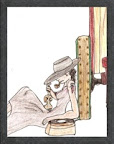Moby Dick, by Herman Melville
Test Test TEst
 | Herman Melville : Redburn, White-Jacket, Moby-Dick (Library of America) By: Herman MelvilleGeorge Thomas Tanselle Amazon Price: $40.00 |
|---|




Test Test TEst
 | Herman Melville : Redburn, White-Jacket, Moby-Dick (Library of America) By: Herman MelvilleGeorge Thomas Tanselle Amazon Price: $40.00 |
|---|
A University of Massachusetts student faces criminal charges for allegedly causing $600 in damage at the Emily Dickinson Museum after attempting to force his way into the building in the early morning hours of Sept. 5. Police say he was very drunk at the time. [ . . . . ] The man first smashed a window and door at the museum in an unsuccessful attempt to get inside, and in the process lacerated his right hand and bled extensively. A bookcase inside the museum was tipped over when he reached inside to unlock the door. Police said the cost of cleaning up the broken glass and the blood was $600.
 An interesting post from Bilgrimage, yesterday. The line that most struck me was this:
An interesting post from Bilgrimage, yesterday. The line that most struck me was this:
The American Scholar - A Dark Page in Our History - By Marcus Rediker
The slave ship is a ghost ship, sailing around the edges of our consciousness. We pretend it is not there, but it haunts us. It also challenges us: a telling test of any society that considers itself to be a democracy is its ability to face the dark pages of its history. Do we dare in this post-9/11 age to look back on the terror that was instrumental to the making of America?I found this reference in 3quarksdaily. The quote comes from a speech given by the author of a new book documenting the American slave trade (this is the 200th anniversary of it's being abolished, here, apparently), but the idea of a ghost ship was so evocative, and the more I consider it the more perfect. The quintessential ghost ship tale in English literature is probably the Rime of the Ancient Mariner, and it speaks to the point that Mr. Rediker does with a certain poignancy. The Mariner and his crew are accidentally driven into the waters of Antarctica, where they suffer until they are led out by a great albatross, a sort of tutelary spirit there - only as they enter warmer seas, the Mariner kills the albatross with a crossbow. Later, he is forced to wear the body of the bird about his neck, as a representation of the weight of his sin. Leaving aside the finer points of literary narrative, this struck me as such a powerful literary narrative, that we, as a nation were carried from the squalor of the early colonies largely on the wings of the unwilling slaves - not only in the south, where they had plantations, but in the North where Massachussets, for instance, was founded on the infamous Triangle trade, producing molasses to be made into rum, from the sugar plantations of the Caribbean. We expanded westward by trampling on the Native Americans, and more or less enslaving wave after wave of 'albatrosses' - the Chinese immigrants that built the transcontinental railroad, the immigrants that we stuffed into the squalor of cities and used to enrich the pockets of factory owners, and establish our industrial might, the Irishmen in the civil war, taken straight from the dock of the immigration ship to the dock of the military ship, then shipped back a few months later on the same ships in coffins. This is what our nation was built on, this is, more or less, the only reason our nation survived and prospered, and we wear these sins about our necks, always travelling onward, but never resting. Like the mariner, I do not think we can recreate the things we have destroyed. I don't believe in restitution for the ancestors of slaves, not because I don't think they are owed something, but because any payment you could give would be an insult to what we took by force, so long ago. Redemption is a process of love, mercy, forgiveness. It's not something that can be 'made right', anymore. In one of the most famous ships, the Mariner's ship happens upon the ship where Death and Life-in-Death play at dice, to claim the souls of the men on the ship. Death wins the lives of the crew, Life-in-Death wins the soul of the mariner, the guilty one. And the Mariner is cursed, forever, to wander the earth and tell his tale to instruct the world's people with his history. America, if it cannot man it's ghost ships, it's ships of pain and injustice and sorrow, is doomed to the same fate - to live on as a mockery of life, as a mockery of what it is meant to be, to serve as a warning instead of a beacon. Read More......
Posted by
Keshalyi
at
20:28
0
comments
![]()
Labels: Coleridge , george washington , ghost ships , history , Rime of the Ancient Mariner , slave trade , slavery
There was an attempted break-in Friday morning at the Emily Dickinson Museum in Amherst, specifically, the 1813 Dickinson Homestead in which the poet spent most of her life.
Thieves, floods, forces of nature, leave a poor dead woman be! I'm a bit puzzled, honestly, as to what they'd steal - the only thing actually belonging to Dickinson there, supposedly, is one of her dresses, or so I'm told. The rest is just a suggestion of how someone thought things might have looked at the time. Not, I suppose, that none of that is valuable. It just seems more profitable to break into, say, an antique that will be invariably less protected. I imagine it had more to do with the thrill of the thing than any sensible motive.
 Haiti OK's new prime minister, government - 09/05/2008 - MiamiHerald.com
Haiti OK's new prime minister, government - 09/05/2008 - MiamiHerald.com
(Photo from HaitianDiaspora.com)
Good for Haiti! At last, it's done, they've managed to assemble a government against all luck, I like the new Prime Minister. She's a capable-sounding woman, with a lifelong interest in the things that matter in Haiti, right now. I thought a quote from the article was terrifically indicative, both of the hopelessness, and ever-blooming hope in the Second Oldest Western Republic.
Still, the U.S.-educated economist and educator and her cabinet faces a daunting task. The storms have left many parents unable to afford school fees, and lawmakers are now asking that the beginning of the school year be delayed until October. They are also seeking relief for Gonaives and other areas hard-hit by this hurricane season's storms. Also, the five months of impasse has cost Haiti hundreds of millions of dollars in badly needed dollars to address rising food and oil prices and meet the impoverished nation's basic needs. ''The condition this country is in at the moment, everything is a priority,'' Clérié said. ``But I am very optimistic about her.''
Internal emails reveal that a US legal counsellor inside the IDB proposed to the US Treasury that, though the loans faced no legitimate technical obstacles, the US could effectively block them by "slowing" the process. Indeed, by requesting further review of the loans, Haiti would have to make scheduled payments before the funds were even disbursed. "While this is not a 'bullet-proof' way to stop IDB disbursements," the counsellor wrote, "it certainly will put a few more large rocks in the road."The reason?
In 2001, US officials threatened to use their influence to stop previously-approved IDB funding unless Haiti's majority political party submitted to political demands to accept a particular apportionment of seats in a Haitian electoral oversight body. Soon after, at the behest of the US, instead of disbursing the loans as planned, the IDB and its members took the unprecedented step of implicitly adding conditions to require political action by Haiti before the funds would be released. These actions violated the IDB's own charter, which strictly prohibits the bank and its members from interfering in the internal political affairs of member states.Why can't we just keep the promises we make? If we don't want to keep them, why do we make them in the first place?






